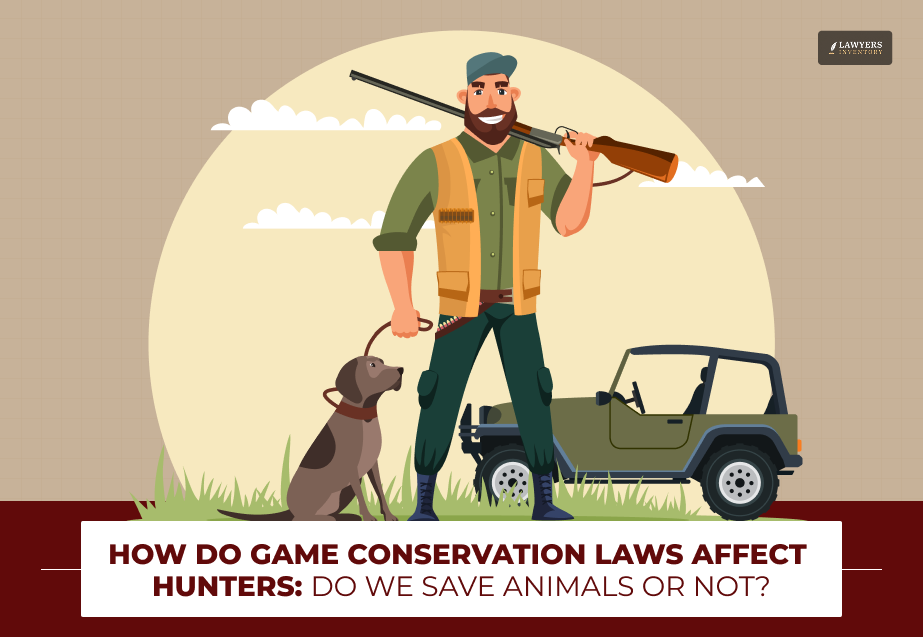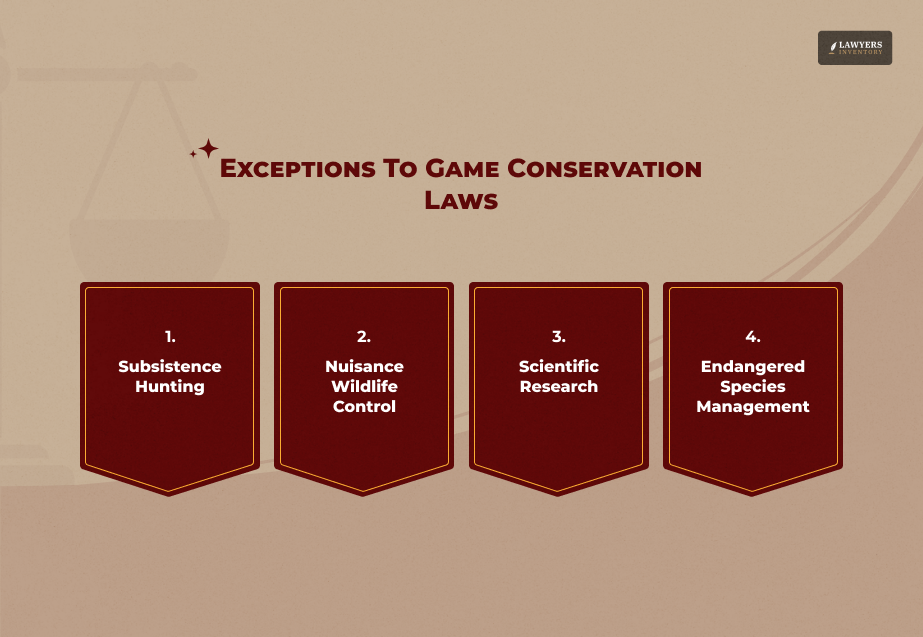
Laws about game conservation are necessary to preserve ecological harmony and guarantee ethical hunting methods.
For example, taxes on hunting gear under the Pittman-Robertson Act of 1937 have raised approximately $14 billion for wildlife conservation in the United States. Both hunters and wildlife have benefited from the restoration of many species and their habitats made possible by these funds.
However, for hunters, these regulations also present several advantages and difficulties. On the one hand, they contribute to the conservation of wildlife populations, guaranteeing hunting pleasure for decades.
For instance, the number of white-tailed deer in the United States has increased from about 500,000 in the early 1900s to over 30 million due to conservation initiatives.
In this article, I will talk about the following things:
- What are Game Conservation Laws?
- How do game Game Conservation Laws affect hunters?
- What are the challenges of Game Conservation Laws?
So, if these are some of the things that you want to know, keep on reading this article till the end…
What Are Game Conservation Laws?
Before moving on to answering “How do game conservation laws affect hunters” let me explain what these laws are in the first place!
Game conservation laws were created to keep animal populations alive and also to ensure that hunting can be sustained. These regulations are generally passed by national, state, or provincial lawmakers.
The main aim of game conservation laws is to keep an even balance between the amount of hunting and animal populations.
In order to prevent overhunting and to guarantee that animal populations can give birth to and increase, this involves the control of hunting seasons, bag limits, and hunting methods.
How Do Game Conservation Laws Affect Hunters?
Game conservation laws are the regulations that manage animal populations and protect them. Such laws regulate hunting activities, which helps prevent the total depletion of animal species, thereby allowing for ecological balance and promoting biodiversity.
The idea of game conservation was first recognized in the early 1900s when it was found that overhunting had brought many species to the verge of extinction. Countries’ response was the advocacy of laws to regulate hunting activities.
The primary goals of game conservation laws are threefold:
- Protecting Wildlife Populations
- Ensuring Sustainable Hunting Practices
- Maintaining Ecological Balance
Positive Impacts on Hunters
Game Conservation Laws have a significant impact not only on wildlife but also on hunters. It promotes sustainable hunting practices, conserving wildlife populations, and boosting local economies.
Game conservation laws provide numerous benefits to hunters and the broader community. Now, let us look at the positives, shall we?
- Sustainable Hunting
- Wildlife Conservation
- Economic Benefits
Negative Impacts on Hunters
While game conservation laws are essential for protecting wildlife populations, they can also negatively impact hunters.
Let us take a look at a few of these. By understanding these impacts, we can work towards finding a balance between conservation and hunting interests that benefits both wildlife and people. Here are the negative impacts of such a law that you should know about:
- Restrictions
- Economic Consequences
- Social Impact
What Are The Challenges Of Game Conservation Laws?
Hunting on public lands is often less available because of restrictions or the unavailability of access to private land. Such activities as farming, real estate development, and conservation work can lead to a decrease in hunting potentials.
Hunting law enforcement is very challenging in faraway places, where there are not enough resources and the cooperation of the people is not available.
Global warming can result in the disappearance of habitats and can cause wildlife to relocate. The attitudes of society and the state of the economy can also affect the degree of hunting practice.
Such a problem requires collaboration among the government agencies, non-profit organizations, hunters, and landowners.
Here are some of the challenges that you should take a look at:
- Access to Public Lands.
- Conflicts with Other Land Uses.
- Enforcement Challenges.
- Climate Change.
Social and Cultural Factors:
Societal attitudes towards hunting can vary over time. As more people become concerned about animal welfare and environmental conservation, the pressure to restrict hunting activities might increase.
Economic conditions can also influence hunting participation. During economic downturns, hunting may become less affordable for some individuals.
Are There Any Exceptions To Game Conservation Laws?

Game conservation laws focus primarily on protecting animals from extinction and ensuring that hunting is done in an ecologically sustainable manner.
Meanwhile, some particular exceptions to these laws provide the possibility of law flexibility in some specified conditions.
They are extremely cautious as they regulate such exceptions in order to give attention to human needs while at the same time not sacrificing the objectives of nature conservation.
- Subsistence Hunting: Most times, indigenous people living in different places (such as the Arctic, Canada, the Amazon, and so forth) are allowed exceptions to game conservation laws for subsistence hunting. Such an activity is very significant for their survival and cultural tradition.
- Nuisance Wildlife Control: The exceptions can be used as a means to control nuisance sources of wildlife that pose safety threats to humans, their properties, or other wildlife besides them.
- Scientific Research: Some wildlife researchers may be given privileged permits that allow them to capture, mark, or even kill animals as a part of their study. Strict government regulations are in place to ensure that these activities do not diminish the populations of wild animals.
- Endangered Species Management: On certain occasions, there are a few exceptions to the management of endangered species. Along with controlled hunting to avert the invasion of those animals that may lead to ecosystem damage, there could be other methods as well.
Why Are Game Conservation Laws A Global Phenomenon?
The American alligator had only a slim chance of survival in the past. However, it has been brought back from the dead to an abundance of over 5 million individuals, which is a great testament to the success of the laws and measures.
Along the same lines, the bald eagle, which is the national bird of the United States, was on the verge of extinction as a result of habitat destruction and hunting.
The population has gradually come back due to the Endangered Species Act and other conservation initiatives, and is currently more than 71,400 pairs compared to only 417 nesting pairs in 1963.
What Happened in the USA, Africa, and Australia
One of the most remarkable achievements of the North American Wildlife Management Plan (NAWMP) is the conservation of the deer, elk, and other big game species by successful implementation of activities.
Hunting through the aid of NAWMP was controlled in a very careful manner and the process not only kept the population in good health but also gave hunters a chance to hunt.
For instance, the NAWMP handled the white-tailed deer population in Texas efficiently and thus, it has increased to a very great extent in the past 30 years.
The governments of several African nations have enacted animal conservation laws to rescue the most endangered species populations such as lions, elephants, and rhinoceroses.
Such laws have led to a major decrease in hunting tourism, which has been excellent for many rural communities that have been dependent on it, for instance, in South Africa, where hunting tourism is an activity that is popular and supports local economies and wildlife conservation efforts.
Nevertheless, the Australian government has opted a different strategy, setting extremely strict game conservation laws for native species like kangaroos and wombats. Despite the success in the preservation of wildlife, the laws had a considerable impact on the hunting culture in Australia.
The dispute over kangaroo hunting is one such example that has divided Australia. While some people back it as a necessary tool for wildlife management, others oppose it as a cruel and inhumane practice.
Here’s What Data Says
The quantity of hunting license sales may explain the impact of the game laws on the number of people who perform the activity.
It is possible that when new restrictions have been introduced, fewer hunting licenses have been sold, and thus the activity has been discouraged among hunters.
On the other hand, if the hunting license sales rise, it would indicate that the laws are good at attracting hunting tourism and therefore, local economies are gaining.
Besides that, the wildlife population can also serve as a basis for judging the success of game conservation laws. The population of animals should be either increasing or stable, so that the laws can be effective.
Hence, if the population of a certain species has recovered from a decline because of the new hunting restrictions, then it is a success of conservation.
What Can Happen If You Hunt In A Restricted Zone?
Restricted zones, also known as wildlife sanctuaries or protected areas, are regions that the government has designated where hunting is prohibited or severely limited.
These areas conserve wildlife populations and protect their habitats. Hunting in a restricted zone without proper authorization can have serious legal consequences.
Potential Legal Implications:
- Fines and Penalties
- Confiscation of Equipment
- Criminal Charges
- Loss of Hunting Privileges
- Civil Liability
How To Avoid Legal Trouble?
To avoid legal implications, it is essential to familiarize yourself with the game conservation laws in your area and to obtain the necessary permits before hunting.
This includes understanding the boundaries of restricted zones and any specific regulations that apply within those areas.
If you are unsure about whether a particular area is a restricted zone, it is always best to err on the side of caution and avoid hunting there.
You can contact local wildlife authorities or consult with a legal professional for clarification.
Read Also:
- Understand Strict Liability in Personal Injury Cases: Key Insight
- What Are The Most Common Causes Of Personal Injuries?
- Navigating Legal Claims For Dog-Related Injuries











0 Reply
No comments yet.